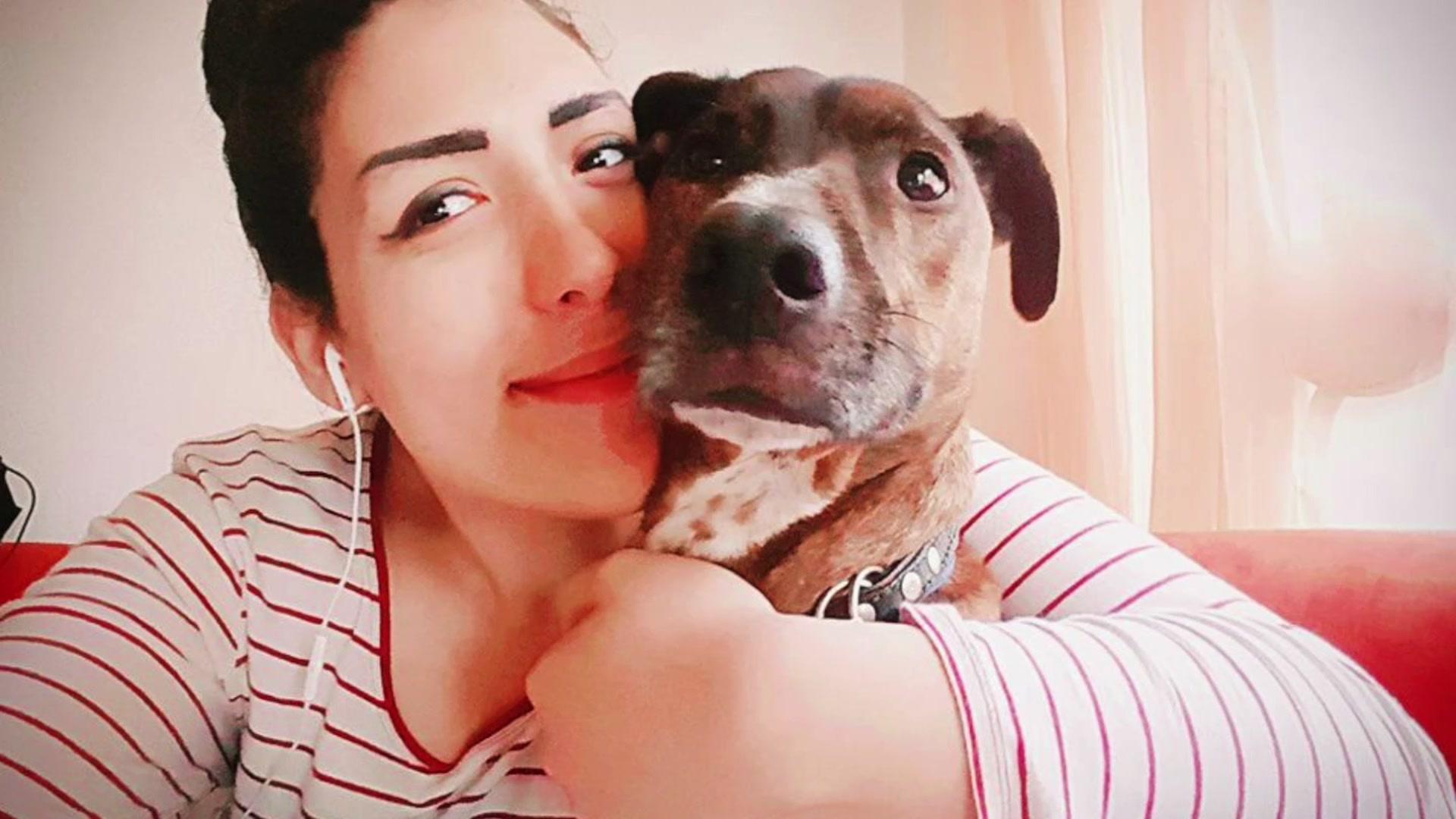Transgender Kyrgyz seek unlikely refuge in Russia
- Published
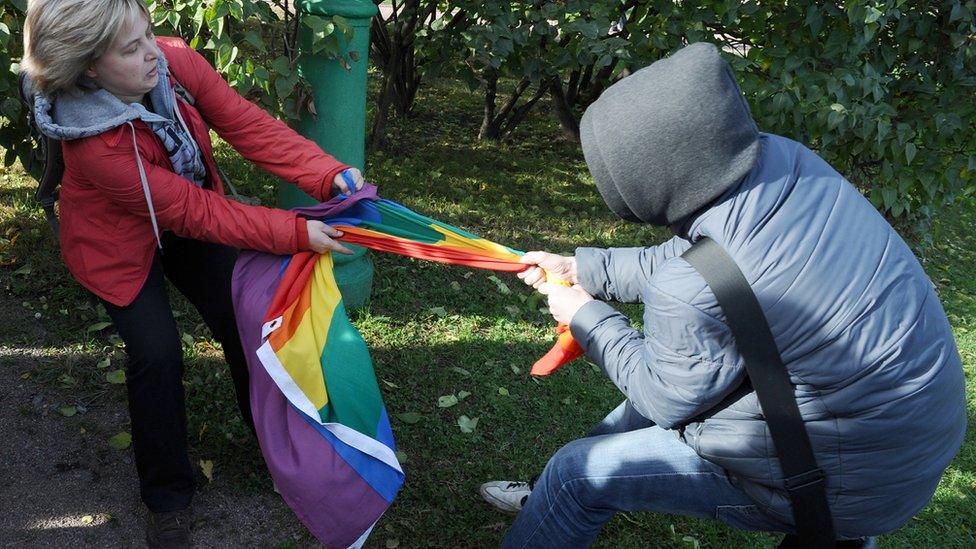
Russia is not known for being a safe haven for the LGBT community
Russia is a notoriously difficult place to be gay or transgender, but it's become a surprising refuge for LGBT people in Kyrgyzstan, who say life is far harder at home, writes Katie Arnold in Bishkek.
Anna knew the internet was a dangerous place to meet clients.
Transphobic hate gangs often scoured the list of sex workers advertising online, looking for their next victim among the faceless pseudonyms.
"I was usually very good at distinguishing who was who, I honestly did not suspect this guy to be dangerous," Anna said, her hand nervously tugging on the skin around her neck, her eyes focused on an object beyond the horizon.
Three weeks earlier, she says, she was kidnapped by two men posing as clients. They laced her beer with a sedative and then drove her deep into the Tian Shan mountain range that towers over Kyrgyzstan's capital city, Bishkek.
She awoke to an immense and sudden pain as her attackers relentlessly kicked her in the head and chest. "You were born a man, you should be a man," she remembers them shouting. Paralysed by the drug and unable to defend herself, Anna begged for them to end her life.
"I was happy to die at that moment," she says. The two men placed a plastic bag around her bloodied head, burnt their cigarettes on her bruised body and left her for dead.
Anna managed to wrestle herself free of the plastic bag. She found her wig, which lay dishevelled on the cold mountain road, then found her way back to Bishkek, where she sought refuge in the city's only LGBT shelter.
"I cannot stay in Kyrgyzstan any longer, it is not safe here," she said. "I am going to live in Russia instead."
'Corrective rape is common'
Kyrgyzstan's LGBT community has lived in the shadows since 2014, when the government drafted discriminatory legislation that would ban the popularisation of homosexual relations and promotion of a homosexual lifestyle.
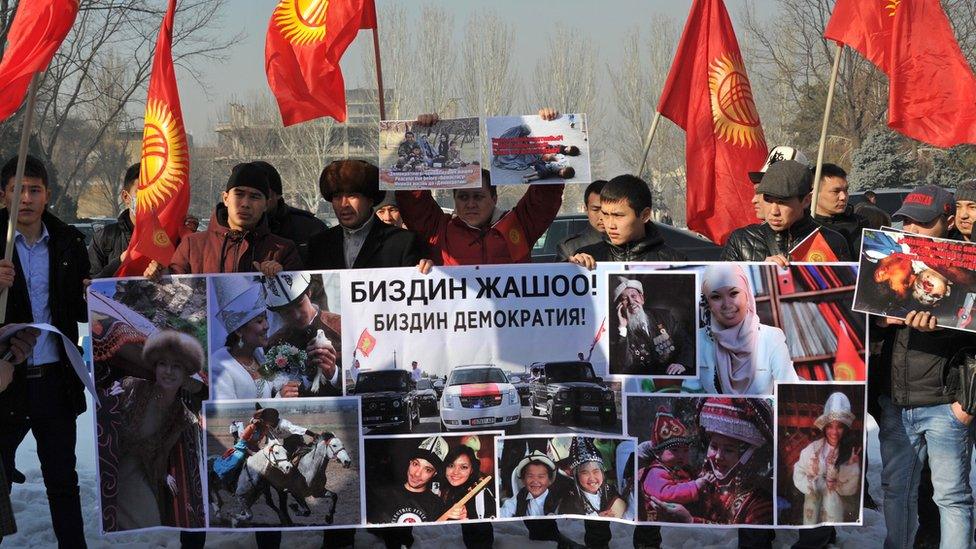
An anti-LGBT protest in Bishkek
The proposed law, still awaiting its final reading in parliament, unleashed a campaign of violence and intimidation which continues to this day.
A survey conducted by the LGBT organisation, Kyrgyz Indigo, in 2016, found that 84% of respondents had experienced physical violence during their lifetime while 35% were victims of sexual violence.
"Corrective rape is common among the LGBT community but especially among the transgender community," said Rudolph, a social worker at the LGBT shelter run by Kyrgyz Indigo.
Like many of the people interviewed, he preferred not to give his second name for fear of attack.
"All members of the community will become a victim at some point, we are looking after someone right now who was a recent victim of gang rape."
Flight to Russia
Amid the hostility, most cisgender members of the community - people who identify themselves as having the gender they were assigned at birth - have chosen to conceal their sexuality in public.
But anonymity has proved difficult for the transgender community, the majority of whom find themselves caught up in the sex industry due to discrimination in the workplace.
It is against this backdrop of violent transphobia that many members of the community are voluntarily moving to Russia - a country renowned for its hostile attitude towards LGBT people.
They join tens of thousands of Kyrgyz migrants who travel to Russia each year, searching for employment opportunities in a country where language does not serve as a barrier.
"Lots of transgender women are migrating," says Roma, a sex worker and outreach officer for local human rights organisation, Tais Plus.
"I've met 10 who have moved to Moscow in the last few months. The ones I have spoken to since say life is not too bad there."

More on LGBT life in Russia

A newcomer to the transgender community, Roma's youthful vigour has not yet been tarnished by a violent attack.
However, like the sex workers he has met though Tais Plus, he too is moving to Russia.
"I think life will be easier for us in Russia because even though there is legislation against sex workers, the police will not target us because we are transgender. Here the police are filming their encounters with us, threatening us with the footage, and then publicly outing us online," he said.
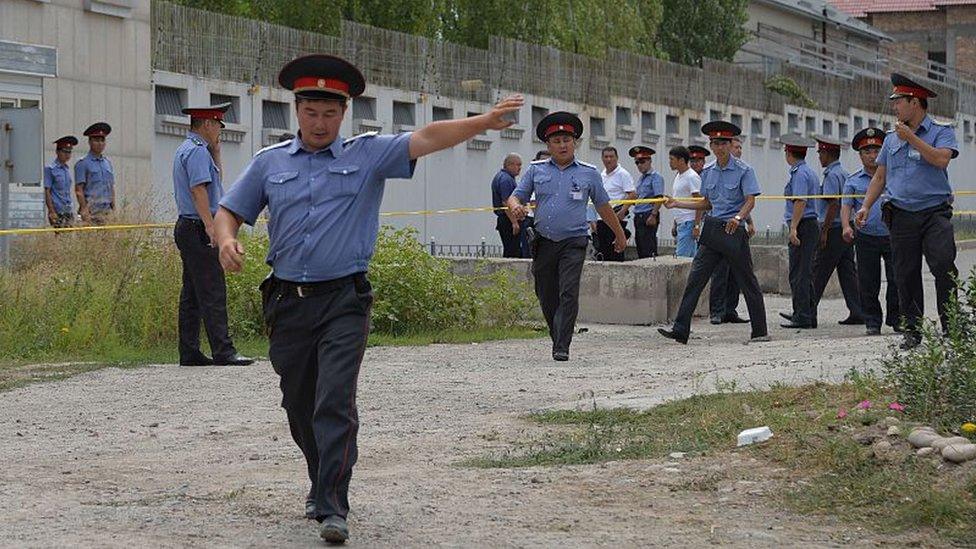
Roma has accused the Kyrgyz police of filming their encounters with transgender people
Selling sex in Russia is illegal, however, with a maximum fine of just 2,000 roubles ($35; £26) the law is rarely applied. According to the Sex Worker Rights Advocacy Network, external, there is a large and open sex industry in many parts of Russia due to widespread police corruption.
Homosexuality was decriminalised in Russia in 1993. However, prejudice against LGBT people has remained widespread.
In 2013 a federal statute, widely knows as the Gay Propaganda Bill, criminalised the promotion of "non-traditional sexual relations" to children.
Like in Kyrgyzstan, these anti-gay laws contributed to a surge in vigilantism across the country, with gay people often lured to meetings where they would be beaten and humiliated.
"Transgender people face all kinds of violations in everyday life, more than homosexual or bisexual people," warns Svetlana Zakharova from the Russian LGBT Network.
"But the problem here is more with society as a whole rather than the police - they do not care if someone is transsexual unless they violate some societal norm by speaking out publicly."
'What's the point in caring?'
This news will come as some relief to Anna as she prepares for a new life in Russia.
Earlier in the year she was drinking with some transgender friends in a bar often frequented by sex workers. The bar manager took offence to their appearance and started physically attacking the group.
"We called the police saying that we were being beaten and needed their help, they showed up with a TV crew who broadcast our faces to the country.
"We don't have any rights here - no right to safety, privacy, sexuality and the police are the ones encouraging it, that's just how it is in Kyrgyzstan," she said.
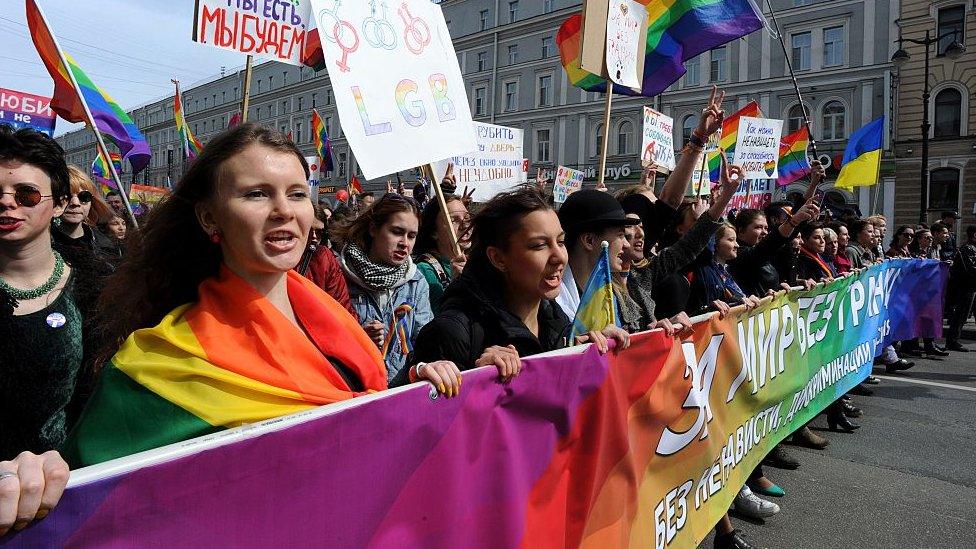
Members of Russia's LGBT community wave rainbow flags at a May Day rally
The ministry of internal affairs did not respond to these allegations of police abuse, put to them in a formal letter.
This came as little surprise to Anna, who reported her attackers to the local police but received nothing but defamatory remarks about her appearance in return.
"What's the point in caring?" she asked about the police's inaction. "It will not change the fact that I've been abused or stop others from being abused. All I want to do is leave this country and live somewhere I can have a free and easy life."
The question is whether Russia will offer Kyrgyzstan's transgender women the solace they so desperately seek.
Katie Arnold is a freelance writer
- Published26 March 2018

- Published8 November 2017

- Published29 April 2016
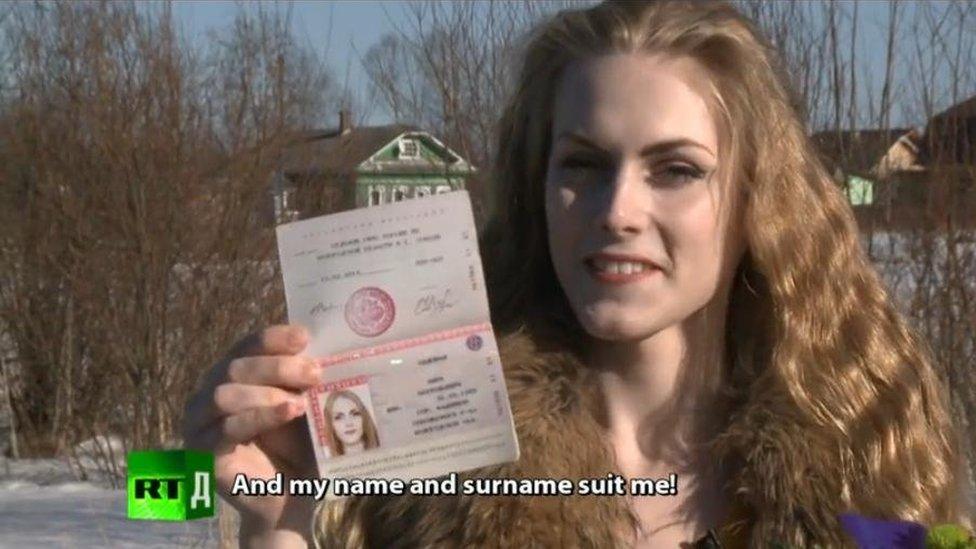
- Published15 July 2015
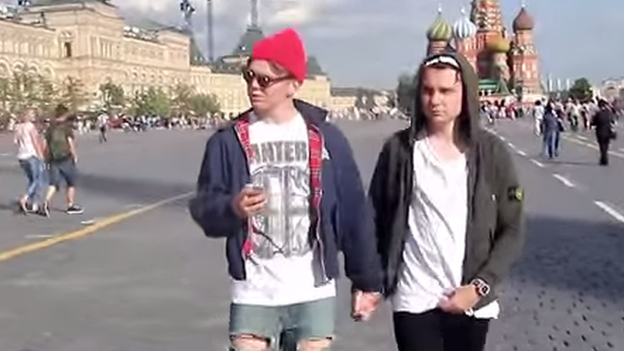
- Published5 November 2017
